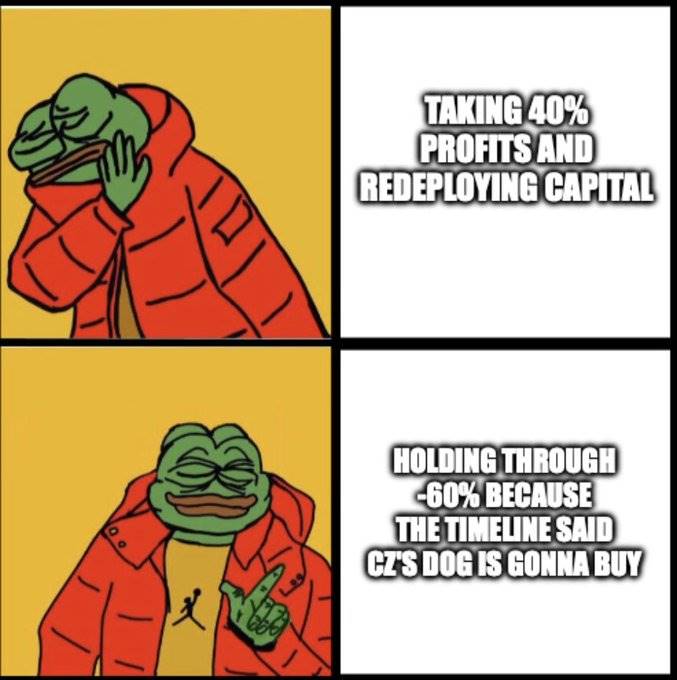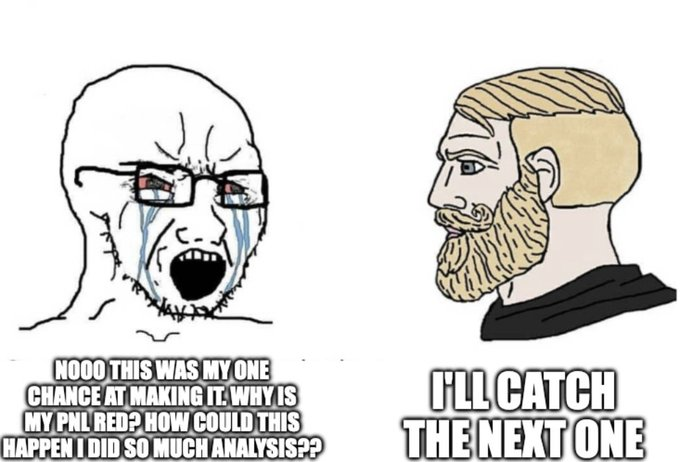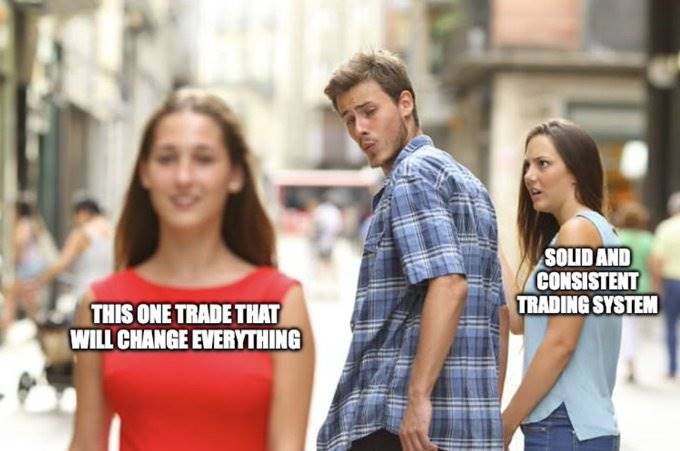Not the market, not the whales, and not manipulation.
Author: VKTR
Translation: Deep Tide TechFlow
This is not financial advice.
I have held an ETH position for almost two years, basically at a break-even point. It feels like dead money, with no movement. It sits in my portfolio like a zombie while other stocks in the market are racing around me.

The Cursed Chart
Now it finally shows a decent profit, but that doesn't change the fact that it might be one of the worst trades of my life. The reason is not the entry point or investment philosophy, but because I couldn't bring myself to abandon this trade and redeploy the funds to something more valuable.
This is a manifestation of the scarcity mindset. I was too afraid to "let go," preferring to watch my money sit idle for two years rather than admit I was wrong and seek better opportunities.
This phenomenon is everywhere. Traders self-destruct not because they can't read charts or time entries, but because they can't make clear decisions about their funds.
I know a trader who made $2 million during the bull market in 2021. By 2022, he was left with nothing. Another trader panicked and sold all his assets when the market first dropped by 30%, only to watch prices rise 50 times while he continued to hold stablecoins. The same psychological setup, different disasters.
Long-term observation of any trader reveals the same pattern. They make a fortune, only to suffer the consequences of not trusting their decisions. A 40% surge turns into a 20% loss because they held their position too long. A tenfold runner is sold at break-even because they don't believe it will continue to rise. A trader who sells a junk coin to zero will eventually panic-sell the next runner due to the "a bird in the hand is worth two in the bush" mentality.
I've experienced both situations. It's not the nonsense of diamond hands or the panic of paper hands, but I've seen enough good opportunities turn into regrets to recognize the true pattern. Sometimes I hold too long, sometimes I sell too early. The commonality is not in my strategy or analysis.
It's fear.
This is not belief, this is not discipline, this is not faith in the technicals.
While it sounds a bit daunting, it may stem from childhood trauma.
Invisible Cage
I believe most trading mistakes actually stem from a scarcity of funds. Every tweet about "holding through the pain," every message in group chats saying "I sold too early," indicates that someone has believed since childhood that such opportunities won't come again. Every trader who can't make clear decisions usually learned early on that money is scarce and precious, and it's best not to waste the few opportunities they have.
Most traders I know grew up in middle-class anxiety, checking their accounts before buying anything. Parents would argue over bills. Every dollar is precious because it might never come again.
This kind of nonsense follows you into trading like a curse.
Imagine this: you make a 40% profit on a trade. Your scarcity mindset starts calculating. "If I hold a little longer, this money could change your life." So you continue to hold. Holding on. Watching your gains evaporate because you can't accept that a 40% profit is enough.
Or the opposite situation: you gain 40%, and your scarcity mindset whispers, "Take the money and run. You might never see green again." So you sell it, only to watch it rise to 400%, while you hold cash, blaming yourself for not believing in the setup.

Scarcity mindset chooses financial trauma over financial freedom.
Both reactions stem from the same viewpoint: believing that opportunities are limited and precious.
Behavioral economists have studied this for decades. When you grow up under financial pressure, your brain instinctively believes that every decision could lead to disaster. Your childhood experiences are manipulating your trading account, and they are likely causing you to lose money.
Abundance Asymmetry
Meanwhile, there is another type of trader in these markets. They often grew up with money or at least had stable financial situations. They make decisions without a care. Profits are held, losses are cut, and positions are adjusted appropriately. There is no emotional attachment, no vicious cycle of "what if…"
They genuinely believe that more opportunities will come in the future, while many of us do not.
Abundant traders think: "I will let this winner run and manage my risk appropriately. There will always be another trade." Scarcity traders think: "This might be my only chance at financial freedom, so I either lock it in immediately or let it go to zero."

One approach creates wealth, while the other brings anxiety.
Why Everyone Makes Wrong Decisions
The most expensive lie in the cryptocurrency space is not "diamond hands" or "always profitable," but the idea that there is a right answer to every trade.
Honestly, I think we are just afraid. Afraid of missing out. Afraid of making mistakes. Afraid that if we take one wrong step, we will never have such an opportunity again.
This phenomenon is everywhere. Those traders you might call "maximizers" cannot make clear decisions because every trade could change everything. They hold profitable stocks too long, only for them to turn into losing stocks. They sell profitable stocks too early, only to watch them go to the moon. They keep adding to positions without managing risk. They treat every decision as irreplaceable.
They are trading their childhood trauma, not the market.
The True Cost of Narrow-Mindedness
The scarcity mindset not only affects your trading but also your entire relationship with money and opportunity.
I once made 5 times my investment on a position but couldn't bring myself to take profits. I watched it slide down over three months, ultimately back to break-even, because I was haunted by the fear of "selling too early." But I also panic-sold profitable stocks when they were up 30%, only to see them rise to tenfold because my brain couldn't believe I deserved that wealth.

The scarcity mindset leads to specific types of self-destruction:
Decision Paralysis — You can't decide when to buy, sell, or hold because every choice feels like it could ruin everything. You feel stuck, unable to manage risk dynamically.
Binary Thinking — You believe every trade is either "diamond hands forever" or "take profits immediately." You can't scale positions up or down because you don't believe you can make multiple correct decisions.
Risk Distortion — You either go all-in on a trade or take no meaningful risks at all. You can't find the middle ground that truly accumulates wealth.
The Abundance Secret
The solution doesn't necessarily lie in therapy or meditation, although I find the latter helpful. The key is to get your brain to believe that money is a renewable resource, not a limited one.
Try asking yourself, "What would someone with $10 million do in this situation?" I can guarantee they wouldn't hold a stock until it drops 80% just because they "believe in the tech." But they also wouldn't sell in the first 20% of a bull market out of fear of volatility.
Experienced large-cap traders do not get emotional about a single trade. They think about risk management and position size, not absolute returns. They prefer to make consistent decisions rather than chase perfect ones.
Truly Effective Methods
I wish someone had told me these things five years ago, and the truly successful traders I see do the same:
Consider various scenarios, not absolutes. Set multiple profit targets and risk levels before trading. Don't let the scarcity mindset convince you that there is only one right way to do things.
Measure your position size as if you are already wealthy. If you had $1 million, would you bet 100% of your risk on one altcoin? Then why would you do that with your $10,000 account?
Practice dynamic risk management. Take profits when they are large. Add to positions when you are right. Cut losses when you are wrong. Don't treat every decision as permanent.
Calculate opportunity cost. Every dollar tied up in an ineffective trade means you miss out on opportunities elsewhere. Every dollar you panic-sell means you could have achieved compounding growth.
The Compound Effect
Abundant thinking makes you more money than scarcity thinking. The desperate pursuit of perfection in every trade often leads to fewer good trades overall.
When you start thinking abundantly, you will make better decisions. You will take profits at the right times. You will let some winners run. You will cut losses. You will wait for good opportunities. You will stop revenge trading. You will stop getting caught up in high-level narratives out of fear of missing out.
All these small decisions will accumulate. You will no longer be caught in the boom and bust cycle of scarcity trading, but will begin to accumulate stable, lasting wealth.
The market rewards patience, discipline, and strategic thinking, punishing desperation, greed, and emotional decisions. Your mindset determines which category you belong to.
Breaking the Cycle
I still struggle with this. Even now, with a larger account size and more experience, I sometimes find myself making decisions out of fear rather than rationality. The scarcity mindset is deeply ingrained.
But I have learned to recognize it. And I see the same pattern in every trader who transitions from consistent losses to consistent profits.
The first step is to acknowledge that your scarcity trap exists. It's not your fault—it's shaped by your childhood experiences with money. But it is your responsibility to change it.
Heal and Win
Your relationship with money was formed before you learned to walk, and every trade you make could cost you money. The scarcity trap is poverty thinking dressed up as strategy.
I have learned this the hard way. I lost more money making those terrible decisions than I did making logical ones. I have turned winners into losers more times due to overthinking than when I followed my plan.
I believe this pattern destroys traders more than any bad technical analysis or market crash.
Your childhood experiences do not determine your trading fate. But you must recognize that your scarcity mindset is the true enemy. Not the market, not the whales, and not manipulation.
Your brain is breaking down, causing you to continue breaking down.
First, solve this problem. Everything else is just strategy.
免责声明:本文章仅代表作者个人观点,不代表本平台的立场和观点。本文章仅供信息分享,不构成对任何人的任何投资建议。用户与作者之间的任何争议,与本平台无关。如网页中刊载的文章或图片涉及侵权,请提供相关的权利证明和身份证明发送邮件到support@aicoin.com,本平台相关工作人员将会进行核查。




